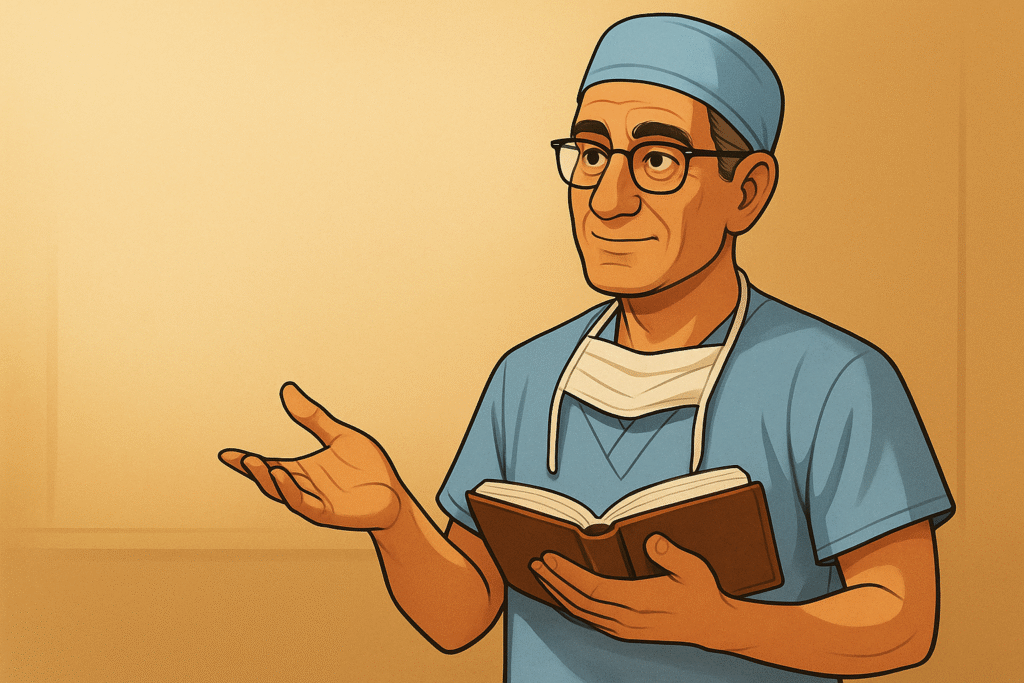One day, I finished a long day in theatre — back-to-back cases, non-stop focus, the kind of day where you’re both proud and completely drained.
And I remember thinking: That’s a good day.
But then another thought crept in:
What if I didn’t show up today?
The answer? None of those patients would’ve been helped.
That’s the reality of surgery — your value is tied to your presence.
But what if it didn’t have to be?
What if your knowledge could help patients even when you’re not there?
That’s where teaching comes in.
Here’s why sharing your surgical skills might actually be more valuable — and more powerful — than just using them👇
1. You Can Only Operate on One Patient at a Time
Let’s start with the obvious: your time is limited.
You can’t clone yourself. You can’t be in two theatres at once.
No matter how good or fast you are, you still treat one person at a time.
And tomorrow, the list resets.
But when you teach someone your technique — when you pass on your way of thinking — you’re helping every patient they touch for the rest of their career.
Think about that.
One hour of teaching could lead to hundreds of better surgeries down the line.
That’s not just helping — that’s multiplying.
And that kind of impact? It scales far beyond what your hands alone can do.
2. Your Real Legacy Is in People, Not Procedures
Most surgeons will be remembered by their colleagues and their trainees — not by their operation count.
You could do 10,000 procedures, but unless you’re changing how others think, learn, and practice, that knowledge stops with you.
But when you guide someone, support them, and teach them to operate not just with skill but with confidence and clarity — you’re planting seeds.
Those people carry your influence forward. They quote your sayings. They pass on your methods. They talk about how you made them feel seen, capable, and challenged.
That’s legacy.
And the earlier you start building it, the longer it lasts.
3. People Don’t Just Pay for Skill — They Pay for Clarity
Let’s be real: there are a lot of technically skilled surgeons out there.
But not everyone can explain what they do clearly.
If you can take a complex technique and explain it in a way that a junior doctor or medical student instantly gets — that’s rare. That’s valuable.
People don’t just want expertise; they want understanding.
And if you’re the person who brings that understanding, you become a magnet.
People come to you. They ask for advice. They recommend you to others. And yes — they’ll pay to learn from you.
Clarity cuts through noise.
And in medicine, where confusion can cost lives, it’s priceless.
4. Teaching Builds Trust (Faster Than Operating Does)
Trust isn’t just about being good at your job. It’s about letting people into your process.
When you teach — whether it’s in a theatre, a classroom, or a casual conversation — you’re showing people how you think, why you make certain choices, and what you value.
And that’s powerful. Because once people understand you, they start to trust you more deeply.
They see that you care, that you’re not just there to impress, but to invest.
That kind of trust opens doors. Not just in your hospital, but across specialties, institutions, and even industries.
Teaching isn’t just about sharing knowledge. It’s about building credibility — fast.
5. You’re Not Tied to the Theatre Schedule Anymore
Surgery is demanding. And let’s be honest — it’s relentless.
Your rota tells you where to be, when to be there, and how long you’ll stay.
But teaching? That can work around your life, not the other way around.
You can record a short explainer on your phone. Host a live webinar on a quiet weekend. Write a post, build a course, or offer mentorship on your terms.
And the best part? You can build it once — and use it forever.
Your teaching can live on while you’re sleeping, on holiday, or in clinic.
It’s not just freedom of time. It’s freedom of value.
6. Teaching Builds Real Relationships
Doing your job earns respect. But teaching builds connection.
When someone learns from you — really learns something that improves their confidence or sharpens their judgment — they don’t forget it.
They feel grateful. They feel seen.
And in a field as hierarchical and high-pressure as surgery, that kind of human connection is rare — and powerful.
Over time, those relationships become your strongest allies.
They recommend you, work with you, and invite you into new opportunities.
It’s not just reputation you’re building, it’s a network of trust.
7. Your Brain Is the Most Underrated Asset You Have
You’ve spent years mastering the craft.
But your thinking? That’s where the real gold is.
How you prepare. How you adapt. How you recover when things go off-plan.
That’s the stuff people want to learn. That’s the stuff that can’t be Googled.
And when you turn that thinking into teaching — frameworks, tools, checklists, even mindset shifts — it becomes something others will happily pay for.
And it doesn’t have to be “monetized” in a cheesy way.
It can be shared through mentorship, workshops, or writing.
But make no mistake: your brain is valuable.
And most of us are only scratching the surface.
Final Thoughts: Share, Don’t Wait
You don’t need to be a professor. You don’t need a fancy title.
You just need the willingness to share what you know, in a way that helps others grow.
Start small.
Give a talk. Mentor someone. Write a thread. Post one tip you wish you knew five years ago.
Because while operating will always be important,
sharing your skills might just be what sets you free.
It builds impact that lasts.
It creates opportunities you can’t predict.
And it helps shape the future of surgery — through people, not just procedures.
By the way — I’ve not just thought about this. I’ve lived it.
A while ago, I realised I was sitting on years of experience, insights, and lessons that others were eager to learn. So I started sharing. Teaching. Creating.
And eventually, I began to monetize my knowledge as a surgeon — without burning out or stepping away from the work I love.
If you’re curious about how to do the same, I put everything I’ve learned into a simple, practical guide:
Monetizing Your Knowledge as a Surgeon — my book that walks you through the exact steps to turn your experience into income, impact, and more freedom.
You can get it here
It’s the guide I wish I had years ago , and it might just change how you think about your future in surgery.
Monetize Your Knowledge as a Surgeon
This guide gives you the tools to package your expertise, create value beyond the clinic, and build new income streams — intentionally.
Click Here

